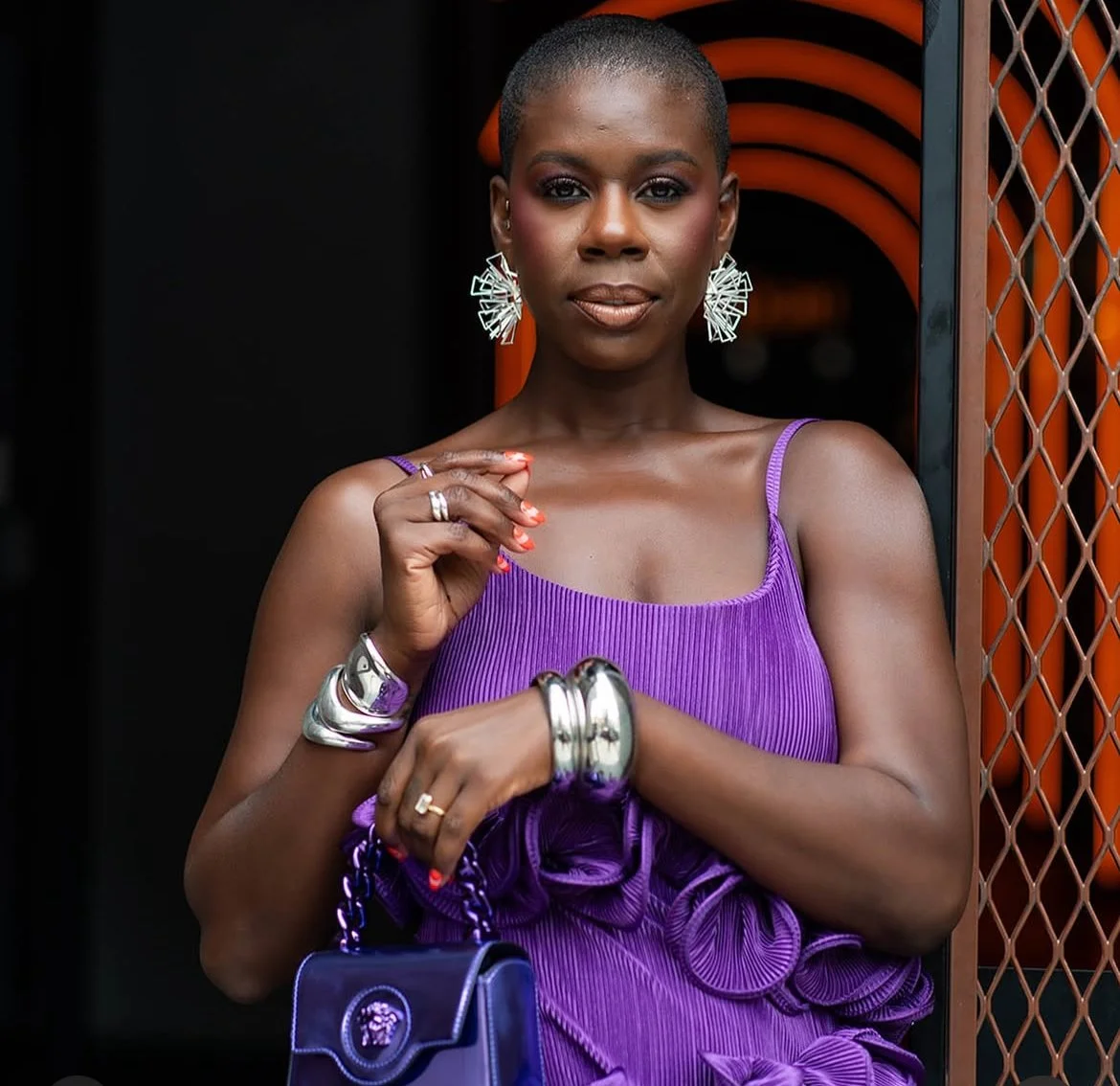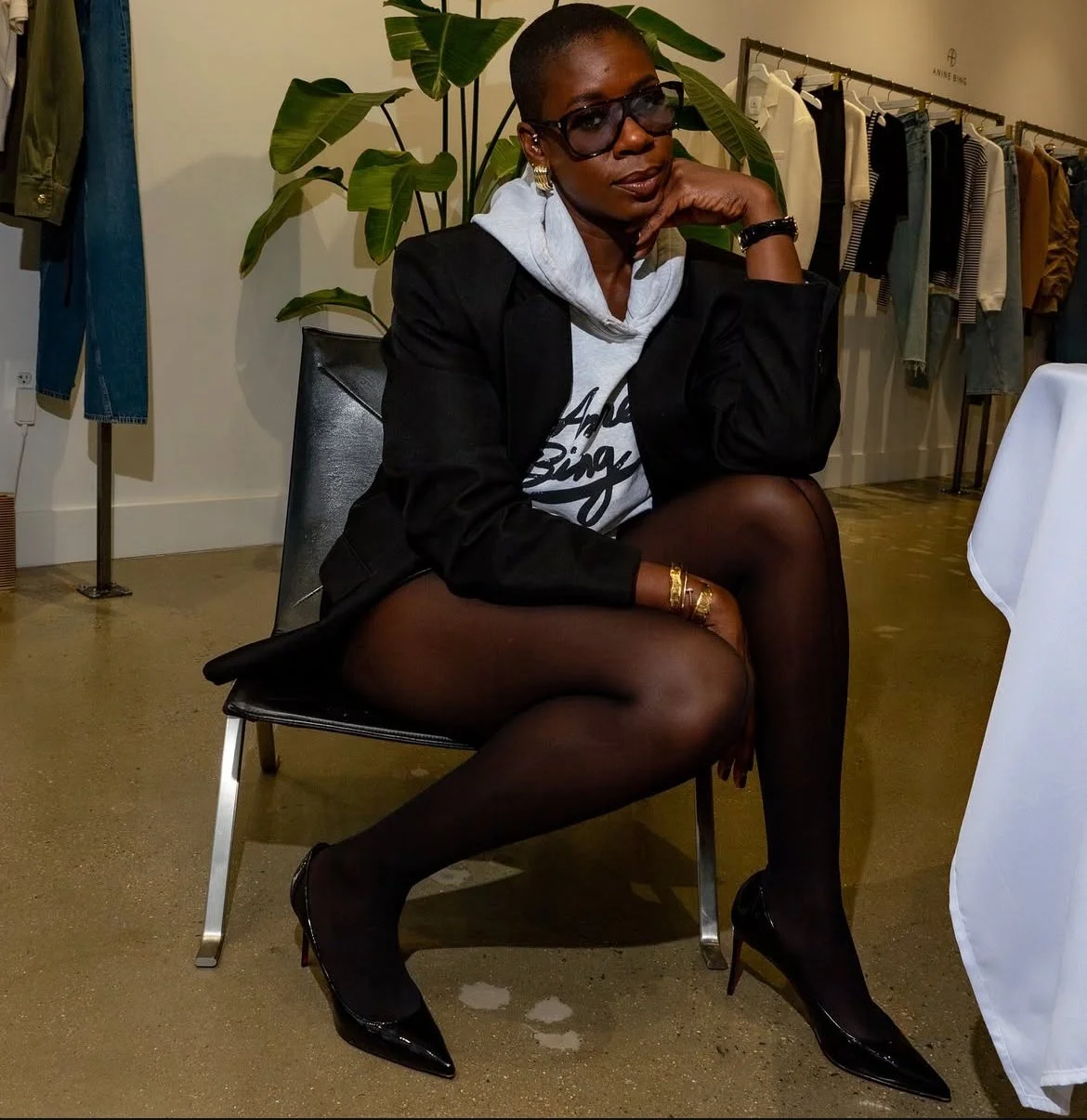Tashira Halyard is a former public policy lawyer turned content creator and equity consultant, blending fashion, self-care, and social justice through her platform, “Politics & Fashion”. As a breast cancer survivor and co-host of the “Just Us” podcast, she empowers women, especially those navigating midlife—to embrace joy, authenticity, and purpose, challenging societal norms with unapologetic Black feminist energy.
Back in undergrad, you originally wanted to major in Fashion merchandising. Your mother was fully supportive while your grandparents wanted you to pick a more practical major. Take us back to how you felt having this passion for fashion but feeling the pressure of being the one who “had to make it”.
TH: I honestly felt at that time a bit of disappointment, but it wasn't overwhelming. I've always really stuck to my guns, if I had something that I was passionate about, I was going to pursue it one way or another and that's how I ended up where I am today. My grandparents encouraged me, aka threatened me, to do something much more practical. I think deep down, I knew that it was good advice, I truly felt that it was the right thing to do and I felt that if pursuing fashion in another way was meant to be, than it would happen. I think things happen for a reason, what I believe is that Florida State is where I went for undergrad and maybe things are different now, but then they were not known for fashion merchandising. If you are going to excel in a career like that, you probably should be at a school like FIT or the New School or be somewhere you have access to internships and where you are part of the epicenter in some ways of fashion. So in a major city like LA, New York, Chicago, even Miami, but definitely not Tallahassee. So I think in hindsight, once again, my grandparents were right. There are many times I could say that in my life because even though they were not formally educated, they understood kind of the passport and the currency that a law degree would provide, and I don't regret it for one moment.
Tashira Halyard (All rights reserved to owner)
In 2011, while you were grinding for the bar exam, you launched Politics + Fashion as a creative outlet. What did that space represent for you at the time, especially as a Black woman stepping into both law and lifestyle?
TH: It represented what I wanted to see, and I think people who are successful digital creators or artists of any type—we are creating spaces that widen the margins a bit, spaces that allow visibility. We are creating what we needed, we are creating what we wanted to see. At that time, I was an activist, I was doing a lot of grassroots organizing, and this was prior to BLM or any of the movements that I think are much more mainstream today. So I'm an OG organizer, and I remember feeling like I was getting a lot of criticism for my passions—around aesthetics and presentation and adornment and fashion writ large. I was like, what if I create a brand that speaks to my activism but also the fact that I want to “put it on”? I’ve had a favorite outfit and style of dress since I can remember. I was in kindergarten like, “Grandmama, do my hair like this, I want to wear this outfit.” I was always into putting clothing and hairstyles together. So I thought, what if I create a brand that merged those two? And at that time, blogging was just starting to take off. I started a small blog sharing my time in Nigeria for a summer internship I had when I was in law school to kind of keep my family and my friends updated on what was going on. And so I said, okay, I've sunsetted that… what if I emerge again with something but just have it take on again that tone and tenor of an activist who likes to look good, who cares deeply about the world, and has a progressive value and a radical politic? So that's when “Politics + Fashion” first started. I remember folks saying to me, “You can't merge those two things.” And what I have learned to say and get people to understand is that everything, as a queer Black woman that I experience daily, is political. Every single thing is political—the way the world interacts with me, the way that I interact with the world. There is some systemic role that is at play every single day, whether it is a role of oppression or working towards liberation. And so that is what the platform is about. It's the only job in life I didn't quit. It has gone from a blog to now being multi-platform in the way that many digital creatives are these days.
“I remember folks saying to me, “You can't merge those two things.” And what I have learned to say and get people to understand is that everything, as a queer Black woman that I experience daily, is political.”
- Tashira Halyard
Many would say you’ve taken an untraditional route as a content creator. You didn’t just create, you studied the game and figured out how to monetize your craft. What were some key lessons you picked up along the way? And for others looking to take a similar path, how can they sharpen their skills to open the same doors?
TH: I'll say that starting my blog in 2011, there was no way to make money as a blogger. Everything was still so new, Google had started placing ads but no one was quitting their full-time job for this. I mean, if you look back at some of the early style content creators like us, Black woman Karen Britt Chick, another woman named Ami Style of Song of Style, two that really inspired me. They were taking pictures with a camera and learning how to code and uploading them on Blogger, you know using these old school ancient websites and platforms. There was no Substack then, but no one was getting paid. It wasn't until probably about 2015-2016 that I started to realize, “Oh, I can actually do this full time”, I can work with brands, I can be more strategic about things like affiliate linking. That's where the research started.
My partner had lost her job and so we said, “Let's put our second bedroom on Airbnb.” This lady comes knocking on my door in 2016 or maybe 2017 and it turns out to be Jenny Dufresne, she was a business coach. We had a conversation and I was working in policy then and she said, “Well, what do you want?” And I started to give her this big academic dissertation. “I'm going to get a PhD and study womp, womp, womp and oh, by the way, I have this blog on this website and I started this 21-day happiness project.” And she was like, “Nah, that's your passion and that's your product.” Fast forward, I began to consult with her and she helped me to develop a solopreneur mindset. Everything can be figured out, you just got to arm yourself with the knowledge. So fast forward, when I was ready to truly pivot, and I like to use the term “buyout.” Buy myself out along these stages, I was already side hustling. I was already making extra money because I had a business mindset and I understood that creating content was just one pillar in a larger strategy. And I still have that mindset to this day.
Tashira Halyard (All rights below to owner)
On a recent panel, you shared a powerful vision for your legacy — “I hope for people to come into the fullness of who they are sooner and take up space fully and wholly however you are and for that to not be a radical form of existence.” Can you unpack that a bit more for us? What does that look like in real life, especially for young people trying to navigate spaces that weren’t built with them in mind?
TH: People always tell me, “You know, you are so bold, you were so brave, you were so genuine.” And I accept and receive those things as high forms of praise and I'm thankful for it. But what I also know is that it's nothing that separates me from them. I want for Black women in firms, I want for queer people and trans people, I want for us to be able to stand loudly, boldly, bravely and confidently and for that not to be something that's radical. I want that to be the norm and not an example of resistance. I think that in a world where so much tells us to conform and to assimilate. Me being a lawyer who refuses to code switch, me being a lawyer who celebrates my culture and where I'm from and talks about playing spades and talking sh*t and shows me with my family at home twerking, like the fullness of my life that is not pandering towards a white supremacist regime. It's what I want us all to experience and to claim love and to adore and to hold sacred. I feel like in many ways it's my responsibility because I do have that passport of my education, the stakes are not as high for me as they might be for someone else. And so if I'm given this access, it's my job to bust through the door, it's my job to bring the fullness of myself and I'm not gonna be like you, I'm going to be like me. The fight is for one day for that not to be an act of resistance and rebellion, for it just to be the way that it f*cking is.
What role does representation play in helping the next generation believe that their dreams and aspirations are truly possible?
TH: Every single thing. I think for us to be on a journey towards liberation, it takes us being able to once again see all parts of ourselves represented somewhere. In academic institutions and media, in public systems, visibility is so incredibly important. And I think for a lot of people in my generation, the first black attorney they will point to is Claire Huxbabel and then after that, it was Maxine Shaw, Attorney at Law from Living Single. And then after that, it was me. So Lucille Clifton says, “Come look at me and see what I have built out of some sort of life. What I created out of starshine and clay under this bridge, come celebrate with me that every day something has tried to kill me yet has failed.” There are not a lot of examples, we are building this, brick by brick and along the way we'll have those little morsels here and little morsels there. And we'll build it as she said, “Out of starshine and clay, we will build the life that we want.”We will build what liberation looks like for us and for generations to come and so visibility is what helps us to get there. It is what allows us to believe that it is all possible. So this moment, I thank you because I've done something right in my life and prayerfully, there will be many, many more for generations to come.
Want to hear more amazing stories like this? Check out our “More of Us” series! If you want to connect with Tashira and support the work she is doing, follow her on social at @politicsandfshn and support her blog Politics + Fashion.



